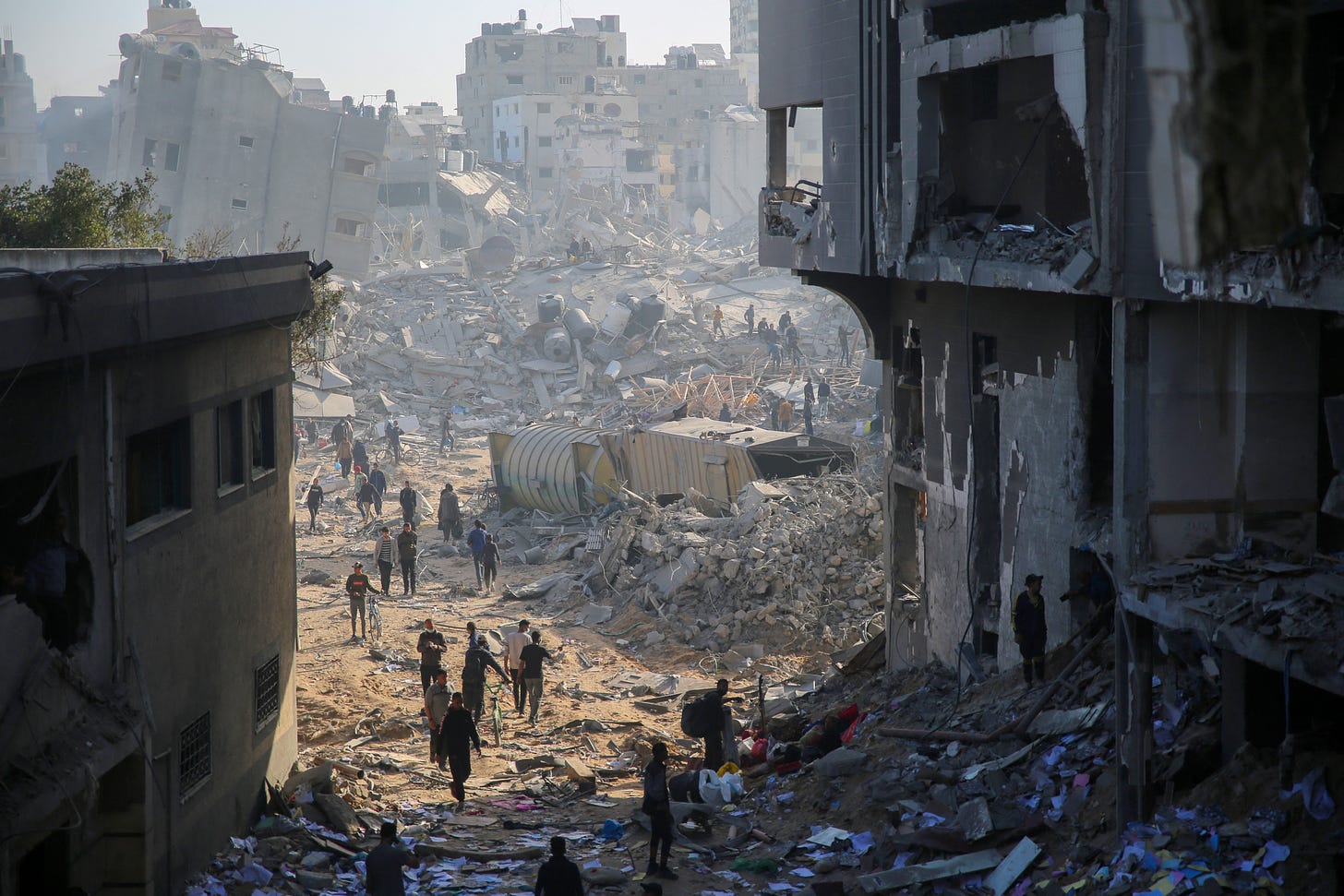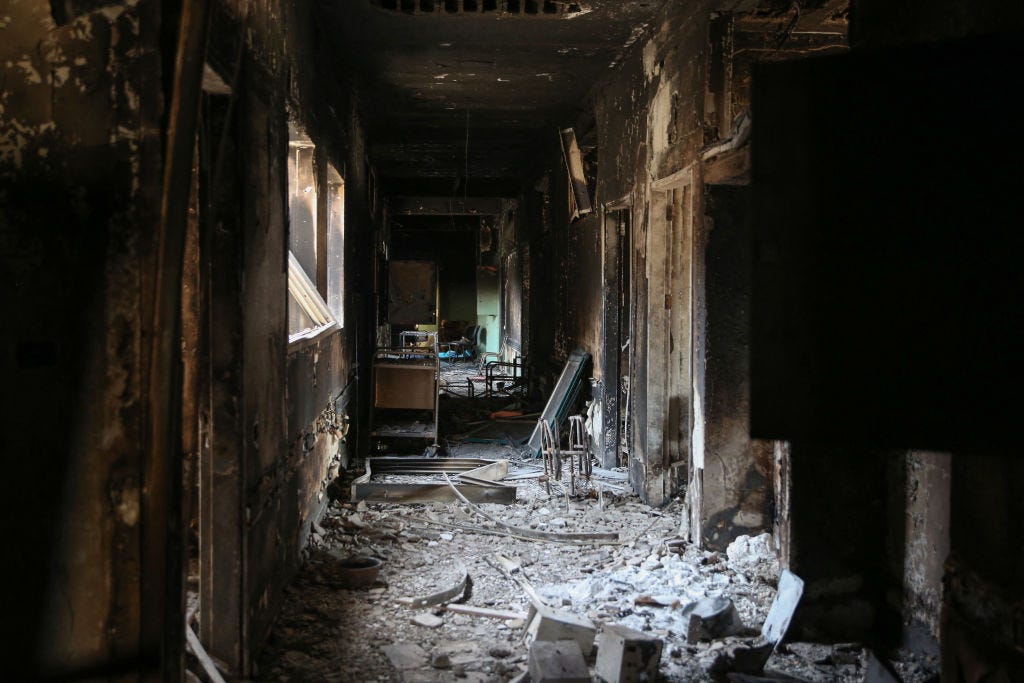Israel Forced Him to Become a 'Human Shield'
Exclusive: I speak to a Palestinian man whose body was used ‘as cover’ by Israeli troops in Gaza City.

They used his body for cover.
I spoke to Waleed*, a Palestinian from northern Gaza, less than six months after he forcibly became a human shield – not by Hamas, as Israel likes to claim, but by Israeli soldiers themselves.
It was March, and Waleed, after previously evacuating his wife and young son to Rafah, had taken shelter in Al Shifa Hospital in Gaza City – the largest hospital in the Gaza Strip. His home had been destroyed, and he wanted to find a stable internet connection so he could continue working as a freelancer, he explained. In Al Shifa, he also thought he could better take care of a family friend who lost both of his legs as a result of an Israeli bomb.
But on March 18, Waleed, who’s in his thirties, awoke to the sound of heavy gunfire. The Israeli army had invaded the hospital and would not allow anyone to leave. This was the second major invasion of Al Shifa Hospital – the first had occurred in November 2023.
“I started hearing gunshots and screaming. I saw a woman and a man who was using crutches, trying to escape,” Waleed told me over the phone from Gaza. “Unfortunately, as they were fleeing, a tank crushed them completely, running over and killing them instantly.”
He said soldiers fired in every direction. “They didn’t care if their targets were children, women, men, or the elderly. Their aim was to kill. Israeli soldiers were shooting at anything that moved,” he told me. “There were a lot of dead people inside Al Shifa Hospital and others who were trying to escape the gunfire by running.” According to Waleed, the Israeli soldiers intentionally aimed and shot at people’s heads. “To kill [them] instantly,” he said.
By the third day of the siege, food and water had run out. Waleed said people resorted to drinking toilet water to stay alive. “I say this while feeling disgusted with myself, but that's how things were, and that was the reality,” he explained. “I had to choose between dying from hunger and thirst or feeling disgusted with myself while drinking from the toilet water. I had to drink, even if it was a very small amount.” He shared the last food he had – a portion he said was barely enough for one person – with 18 people, including children, women, and young men.
“Do you know what it is like to see a dead body in the street? Have you ever smelled death?”
-Waleed
By the sixth day, Waleed and a group of five others decided that they could not stay in the hospital any longer. He knew he would not survive. “Most of us were exhausted from hunger and thirst. We couldn’t endure more than three days without water or food, and the children were crying and screaming from hunger and thirst.” Waleed said those he was with heard others on the floor below them yell, “Come down!”
Waleed and the others believed that if the Israeli army saw them, they would allow them to seek refuge elsewhere as all of them were civilians. “So we all decided to go together, raising the white flag, hoping we would be spared and allowed to go elsewhere,” he said. A woman that was in the group tied her son’s white undershirt around a wooden stick and told Waleed to “carry it.., and lead us.”
As the group approached the Israeli military, Waleed said an Israeli soldier shouted at them and ordered the men to stand on one side, and the women on the other. Boys under 16 years old were told to stay with their mothers.
At one point, Israeli soldiers ordered Waleed and other men to strip to their underwear. That’s when Waleed said he was filmed by an Israeli drone, and a soldier took selfies with him and others – for TikTok, the soldier told him.
The group was forced to walk towards the reception building. “We were 150-200 people, naked. Many soldiers, many tanks, and many corpses.” Waleed said he witnessed Israeli soldiers execute six young men who were tied up by shooting them in the head. The soldiers, Waleed told me, claimed that the men “were inside the Green Line on Oct. 7, even though they looked young,” so young that Waleed believed this claim must be false.
“Using Our Bodies as Cover”
The calmness with which Waleed describes his experience sent chills up my spine. By this point, he has witnessed two people crushed by a tank and the execution of six young men. He has not had food in days and has also witnessed the systematic destruction of the hospital. He keeps repeating over and over again, “many tanks, many corpses.”

Eventually, Waleed sees men being divided into two groups: one group is released and ordered to go south on foot. The Palestinians in the other group are handcuffed. Waleed had assumed that those who were handcuffed would be imprisoned because he had heard numerous accounts of the mass arrests happening at the time. Indeed, Israeli forces arrested more than 900 Palestinians during this second Al Shifa Hospital raid. (Many continue to be held in Israeli detention centers that have been turned into torture camps, including the infamous Sde Teiman, which I wrote about a couple of months ago).
But Waleed later learned that the fate of many around him would actually be much worse. Some of the men who were handcuffed were later forced to wear Israeli army uniforms with cameras strapped to the front. While handcuffed, these men were sent into tunnels to determine whether they contained explosives. Israeli newspaper Haaretz confirmed that the Israeli army had dressed Palestinians in Israeli army uniforms, tied their hands behind their back, and sent them into a tunnel with a camera attached to their bodies. Why, you may ask? Because, according to soldiers interviewed by Haaretz, dogs normally used for such purposes were killed, wounded, or discharged. So Palestinians were, in effect, substituted for dogs by Israel’s forces.
“As they advanced, other soldiers opened fire on the building, using our bodies as cover. It was like a Hollywood action movie for them, but for us, it was terrifying. We saw many corpses, killed and scattered in the street. We saw tanks.”
-Waleed
Waleed felt relieved – he was placed in the group that would be released and ordered to travel south. “It felt like he [the soldier who decided his fate] gave me a new life,” he said. But, he soon learned Israeli soldiers also had different plans for him.




